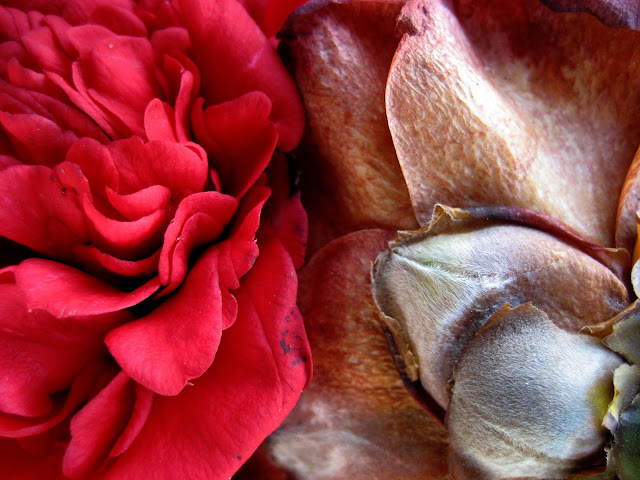 |
| A natural progression. Fresh and faded flowers. February 2015. |
The World Health Organization (WHO) announced 2021-2030 as the Decade of Healthy Ageing.
The World Health Organization (WHO) defines healthy aging as follows (with longer version here and the download site for the full Decade of Healthy Ageing Baseline Report here):
"... the process of developing and maintaining the functional ability that enables well-being in older age.
Functional ability is about having the capabilities that enable all people to be and do what they have reason to value. This includes a person’s ability to:
- meet their basic needs;
- to learn, grow and make decisions;
- to be mobile;
- to build and maintain relationships; and
- to contribute to society."
To be concrete, in visualizing my 90 year-old self, I:
- Live in a universal-design environment and in a walkable community.
- Move myself around my living spaces, unassisted or with the help of a cane, walker, or wheelchair.
- Manage my finances responsibly.
- Engage in regular physical exercise that promotes muscular and skeletal strength, stamina, flexibility (range of motion), and balance.
- Adopt any tools that are accessible to me (e.g. financially) to optimize my sight, hearing, and dexterity.
- Carefully consider the risks and benefits of any meds that a doctor wants to prescribe to me, and decide if the RORI (return on the risk investment) is worth potential compromises in my quality of life physically, emotionally, or cognitively.
- Contribute to and receive quality-of-life support from a solid support network of both family and friends.
- Can say to myself when I go to bed: If I die tonight, I will have no regrets, as I have lived the best life I knew how to do.
- Say yes more than I say no.
- Stay curious.
- Am fearless, as I know that, statistically, my demise is relatively imminent.
I've already done some good prep, for which I needed outside help.
- Quit smoking with Chantix about 10 years ago. In effect, this drug
allowed me to go through nicotine withdrawal while I continued to smoke.
- Whittled myself down to a healthy body weight from morbid obesity some years ago (and am sustaining the weight loss) with the aid of the 12-step program, Overeaters Anonymous.
- Did some growing up with the guidance of Overeaters Anonymous, Al-Anon, and intermittent counseling.
- Learned (and continue to learn) to dance.
- Take risks that require me to stretch physically, emotionally, and intellectually.
- Take risks that might result in rejection. Ouch.
But just so's you know, I was like the vast majority of humans in that I
didn't take the above life-changing actions until I was over 40.
I subscribe to the axiom that (most of us) don't change until our backs are against the wall and the wall is on fire. There was that for me, and also the prize offered by the 12-step path: To be happy, joyous, and free.
So I've traveled pretty far in my physical and emotional walk, but
this path doesn't end until I end, and I've got more stuff to do
health-wise if I don't want to leave my well-being entirely to chance as
I age.
My biggest challenge at COVID's start in 2020: I did not have a discipline of daily physical exercise. Before COVID, I could cover this up with dancing.
But, while it was good exercise, dancing did not replace a discipline of walking, stretching, and resistance/strength-building.
To increase the likelihood of achieving the lovely vision of my 90 year-old self, I had to build the discipline into my daily routine. It had to become as regular as brushing my teeth.
In late 2020, I began a routine of daily walking, resistance-band work, and a few qigong moves. I even took tennis lessons every Saturday for awhile, which was entirely new to me, and which called on muscle movements also new to me.
In December 2021, I picked up my walking pace so I could call it brisk walking, as evidence suggests that brisk walking endows measurably more protection against the progress of osteoporosis and its related fracture risks than "just" walking.
In 2022, my goal is to build in a 20-minute-or-so daily tai chi** or an exercise routine that strengthens most of my muscle groups, posture, and balance.
The above is an adaption of a late-2020 post I wrote in another venue.
No comments:
Post a Comment